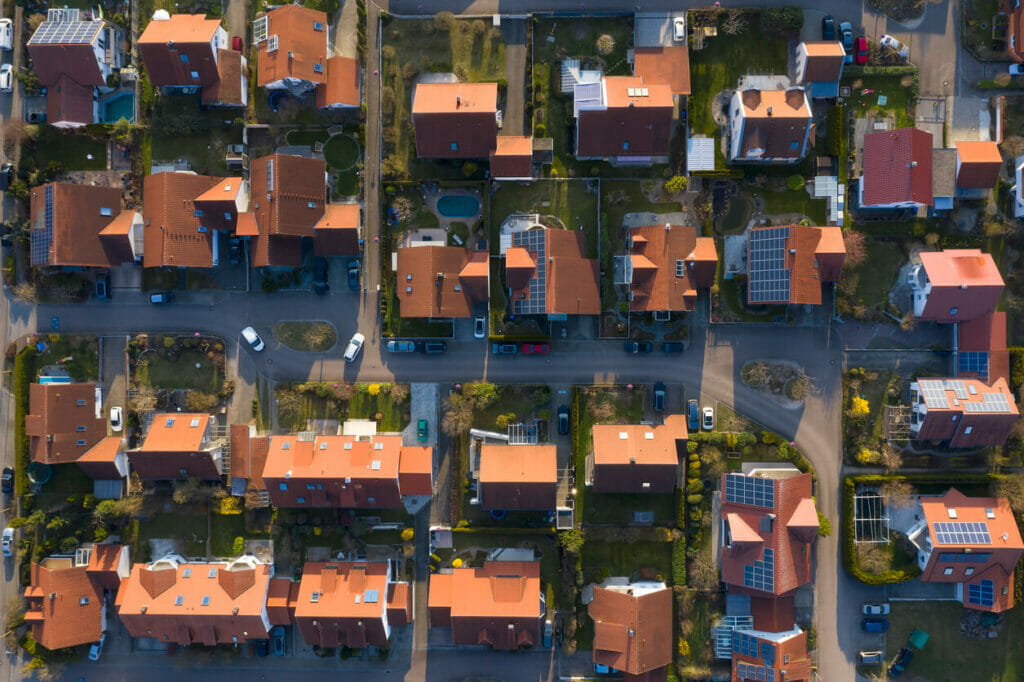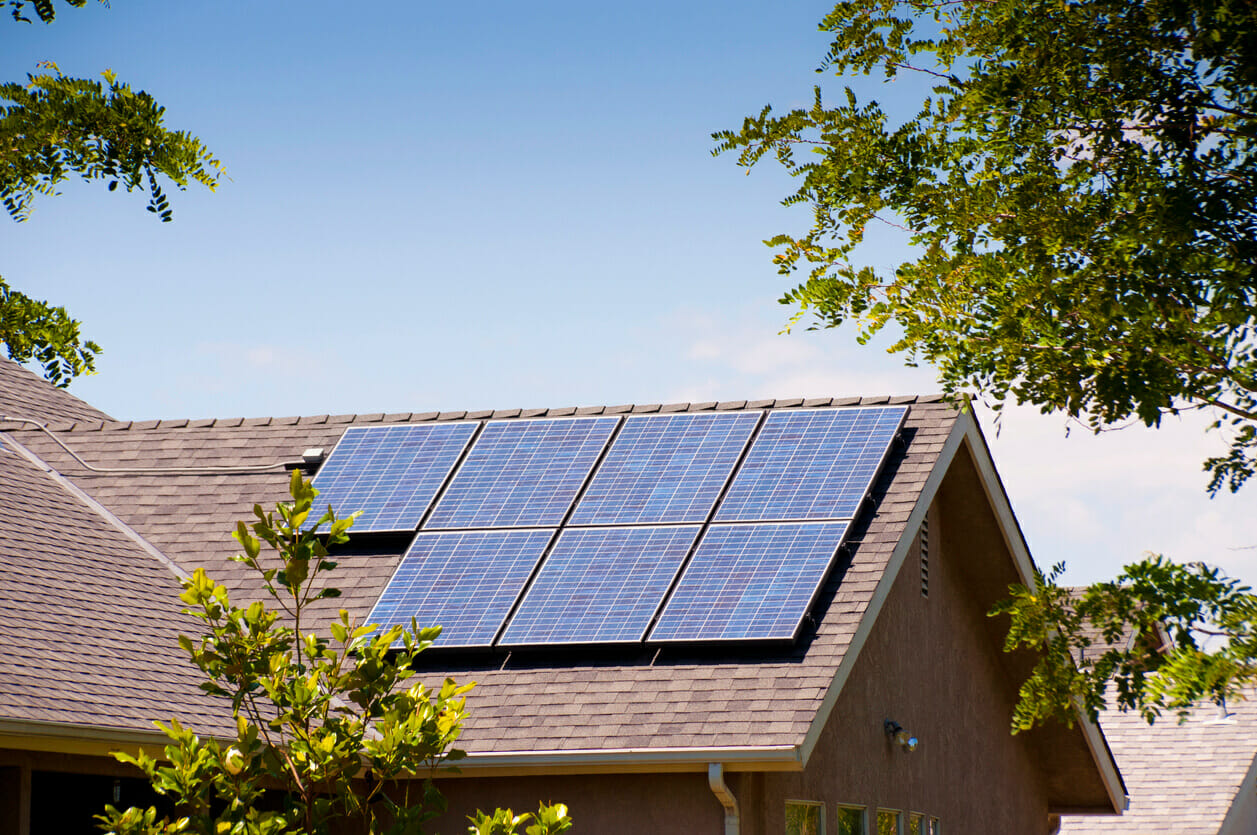Solar energy is becoming a hot commodity. In the last decade, solar has experienced an average annual growth rate of 33%. It was once very expensive to purchase solar panels, but costs have declined and incentives are on the rise. As a result, there has been an increase in demand from homeowners for solar panels.
Solar panels do create concerns for HOAs
While solar panels provide a cleaner source of energy and long-term savings to homeowners, they do create some concerns for HOA communities. Governed associations are required to protect and uphold property values and act in the best interests of the community as a whole. They achieve these goals by creating and enforcing standards that address several itemslike home improvements, renovations and additions. This helps ensure that all homes have a similar value and aesthetic.
Solar panels change the look and character of a home, disrupting the uniformity of the neighborhood. In order to help HOAs navigate through this issue, some states have created solar energy laws that attempt to balance a homeowner’s right to use solar energy and an association’s right to manage the aesthetics of the neighborhood.
Solar access rights
California, Utah, Texas, Arizona and Florida have all enacted solar access rights laws. These laws prohibit HOAs from banning owners from installing solar panels on their homes. However, the laws do allow associations to impose reasonable restrictions when it comes to the installation process, placement and design of solar panels.
The association also has the right to require homeowners to request permission from the architectural committee or board before installing solar panels. The body responsible for approving architectural change requests will then process the request using a structured approval procedure.
Solar access rights vary by state, so owners should check state law before they start shopping around for panels.

Solar easements
In states that provide for solar easements, individual owners can negotiate with the people in their HOAs to protect their right to sunshine. They are designed to make sure that a homeowner’s solar panels receive sufficient sunlight. As an example, a neighbor would have to trim their trees down to a certain height so that the leaves won’t prevent light from reaching solar panels on someone’s roof.
Owners wanting to negotiate this type of easement should know that this is a voluntary process, meaning that neighbors do not necessarily have to agree to a solar easement. If a solar easement is drafted, be sure to include a detailed description of the size and height of the easement.
Exceptions to the rules
There are instances where HOAs could deny owners from installing solar panels on their homes, even if solar access rights statutes exist. Historic districts often have the right to restrict solar panel installation in order to protect the historical character of a neighborhood. In other cases, historic districts might ask that solar panels installed on rooftops be hidden from public view, and that any equipment installed be the same color as the roof.
What if there are no state rules for solar panels?
While more states are creating rules to try and encourage the installation and usage of solar panels, not all of them have rules for panel installation. If there aren’t any existing rules, an HOA could rightfully prohibit owners from installing solar panels on their homes.
Aside from aesthetic concerns, solar panel restrictions may be based on concerns about outdated technology. The newer solar systems are light, easy for professionals to install and don’t cause damage to properties (provided they are installed correctly).
In the future, there may be federal rules governing panel installation since the technology has improved so much. In 2009, The American Clean Energy and Security Act was brought forth. This federal law would have made it illegal for a homeowners association to restrict the installation of solar panels. While the act did not pass, similar legislation may come into play again in the next 10 years or so.
HOAs are encouraged to include solar panel rules in governing documents
Some HOAs don’t explicitly mention solar in their bylaws, and this lack of information can lead to disappointment for new members. If solar panels are not allowed, make that clear in the governing documents. This will give prospective buyers who are interested in solar energy the information they need to make the right decision for them.
Removing solar panels
Associations that do allow owners to install solar panels must consider how roof maintenance costs are to be delegated, and what happens if an owner moves out. If owners are already responsible for paying for their own roof maintenance, then there is little question about who must pay for any costs associated with the solar panels. This can become more complicated if the HOA is responsible for maintaining the roof, however.
Solar panels can last for 25+ years, and, because they have such a long lifespan, they may need to be removed and reinstalled in order to perform roof maintenance. It is possible to remove and reinstall panels, but depending on how many panels there are, that job could cost a few thousand dollars.
It’s also possible to remove panels entirely, full removal without the intention of reinstalling is a more costly project though. That’s because all of the conduit, electrical wiring and roof penetrations must be sealed and undone as if the system never existed. The owner should also be aware that if they don’t yet own the solar system, or are still in the process of paying it off, they may have to pay an additional removal fee. The HOA must make it clear that it is the current owner’s responsibility to remove the system and repair the roof if a new buyer doesn’t want the panels on the home.
Although solar panel installers usually drill holes into the roof to secure the hardware, there are alternative options. One popular option is to install solar roof tiles or solar shingles. This technology integrates the electricity-generating capacity of photovoltaics (PV) right into an owner’s roof shingles and eliminates the need for mounting traditional panels. This solar energy option has many aesthetic benefits, but also costs more and is less efficient than traditional panels.
On the off chance that the HOA has flat roofs, an installation company could use a ballast mounting system. With this type of system, the mounts are weighted down well enough and holes don’t need to be made in the roof. Finally, ground mount solar systems exist, but they require more space, more money and specific soil requirements. Due to HOA rules and architectural guidelines, it’s unlikely that owners would be permitted to install ground mounts.
Conclusion
Solar panels appeal to owners for several reasons. Not only do they help reduce carbon emissions, but they can provide long-term savings as well. Many states are recognizing the benefits of solar energy, which is why they have created rules to promote panel installation.
Understandably, HOAs may have some concerns about solar panels. Owners and boards are encouraged to work together if an owner comes to a board asking for permission to install solar panels. Associations should be very clear about the application process and what is and is not permitted. Similarly, owners should closely follow rules and requirements while being considerate of their fellow neighbors.


